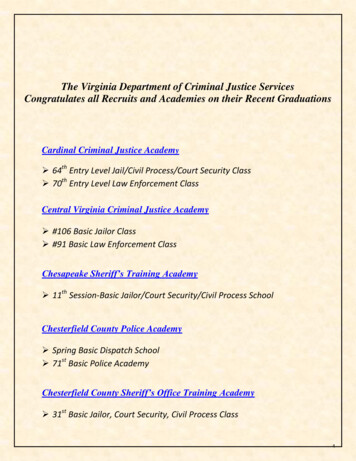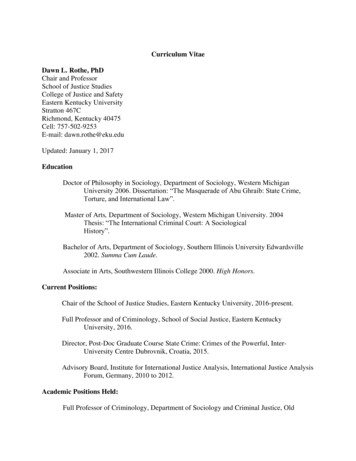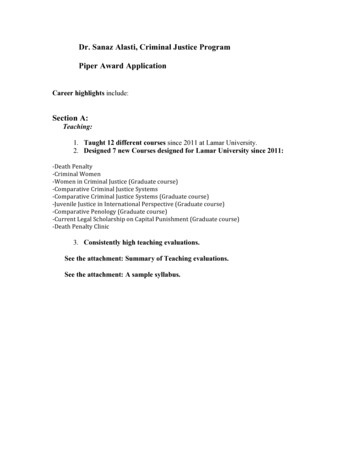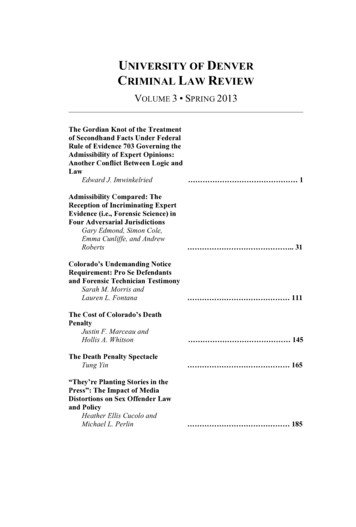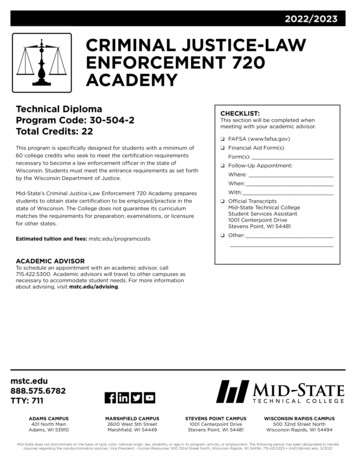
Transcription
2022/2023CRIMINAL JUSTICE-LAWENFORCEMENT 720ACADEMYTechnical DiplomaProgram Code: 30-504-2Total Credits: 22CHECKLIST:This section will be completed whenmeeting with your academic advisor.q FAFSA (www.fafsa.gov)This program is specifically designed for students with a minimum of60 college credits who seek to meet the certification requirementsnecessary to become a law enforcement officer in the state ofWisconsin. Students must meet the entrance requirements as set forthby the Wisconsin Department of Justice.Mid-State’s Criminal Justice-Law Enforcement 720 Academy preparesstudents to obtain state certification to be employed/practice in thestate of Wisconsin. The College does not guarantee its curriculummatches the requirements for preparation, examinations, or licensurefor other states.q Financial Aid Form(s)Form(s):q Follow-Up Appointment:Where:When:With:q Official TranscriptsMid-State Technical CollegeStudent Services Assistant1001 Centerpoint DriveStevens Point, WI 54481q Other:Estimated tuition and fees: mstc.edu/programcostsACADEMIC ADVISORTo schedule an appointment with an academic advisor, call715.422.5300. Academic advisors will travel to other campuses asnecessary to accommodate student needs. For more informationabout advising, visit mstc.edu/advising.mstc.edu888.575.6782TTY: 711ADAMS CAMPUS401 North MainAdams, WI 53910MARSHFIELD CAMPUS2600 West 5th StreetMarshfield, WI 54449STEVENS POINT CAMPUS1001 Centerpoint DriveStevens Point, WI 54481WISCONSIN RAPIDS CAMPUS500 32nd Street NorthWisconsin Rapids, WI 54494Mid-State does not discriminate on the basis of race, color, national origin, sex, disability, or age in its program, activity, or employment. The following person has been designated to handleinquiries regarding the nondiscrimination policies: Vice President – Human Resources; 500 32nd Street North, Wisconsin Rapids, WI 54494; 715.422.5325 AAEO@mstc.edu. 3/2022
CAREER PATHWAYBEGIN AT ANY POINTIN THE PATHWAYOTHER OPTIONSCollege Credit Dual CreditMilitary Experience Work ExperienceRELATED PROGRAMS Advanced Emergency MedicalTechnician Corrections & CommunityAdvocacy Criminal Justice-Studies Emergency Medical Technician Emergency ServicesManagement EMT-Paramedic Fire Protection Technician Firefighter Technician Paramedic TechnicianLearn about Credit for Prior Learning at NINGADULTCRIMINALJUSTICE-LAWENFORCEMENT720 ACADEMYTECHNICIALDIPLOMA22 CREDITSEARN AREER OPTIONS Police Officer Conservation Officer Deputy SheriffBACHELOR’S DEGREE OPTIONSHerzing University and UW-Stevens PointFor more information and additional opportunities, visit mstc.edu/transfer.Page 2888.575.6782 Get the latest updates online at mstc.edu
PROGRAM OUTCOMESEmployers will expect you, as a Criminal Justice-LawEnforcement 720 Academy graduate, to be able to: Think critically.Manage emergencies.Communicate effectively.Demonstrate professionalism.Conduct investigations.Interact with others.Demonstrate technical skills.TECHNICAL SKILLS ATTAINMENTThe Wisconsin Technical College System (WTCS) hasimplemented a requirement that all technical collegesmeasure program outcomes attained by students. Thisrequirement is called Technical Skills Attainment (TSA).The main objective of TSA is to ensure graduates have thetechnical skills needed by employers. Students will completethe TSA requirements through scenario testing at the end ofthe program.Anyone with a felony conviction or a domestic abuseconviction cannot become a law enforcement officer withouta governor’s pardon. Numerous moving traffic violations ora lengthy criminal history or mental illness that prevents theapplicant from performing essential job functions may hinderopportunities for employment.ADDITIONAL ENTRY CRITERIATo apply to the Criminal Justice-Law Enforcement 720Academy program: The applicant shall have attained a minimum age of 18 years. The applicant shall possess a Wisconsin high schooldiploma or a diploma issued by an out-of-state highschool accredited by an appropriate agency of thestate or have a General Education Development (GED)Certificate or a High School Equivalency Diploma (HSED).In Wisconsin, high school diplomas are issued by publicand private schools. A home-based private educationalprogram does not lead to a traditional Wisconsin highschool diploma. A student who is enrolled in a homebased private educational program must attain a GEDor HSED to be eligible for preparatory law enforcementofficer training. The applicant shall possess a valid Wisconsin driver’slicense or such other valid operator’s permit recognizedby the Wisconsin department of transportation asauthorizing operation of a motor vehicle in Wisconsin. The applicant shall not be prohibited by federal or statelaw from possessing a firearm. The applicant shall be a United States citizen. The applicant shall possess either a two-year associatedegree from a Wisconsin Technical College Systemdistrict or its accredited equivalent from another stateor a minimum of 60 accredited semester credits or 90accredited quarter credits. An official college transcriptfrom the educational institution where credit was awardedshall serve as evidence of an applicant having met theassociate degree or college credit requirement. Schoolaccreditation can be checked at the US Department ofEducation website. A physical assessment shall be conducted to verify thatthe applicant can meet the physical standards requiredof a law enforcement officer. The assessment shall beconducted by a Wisconsin licensed physician who shallprovide a signed written report on the results of theassessment to the training school. An oral interview shall be conducted with a panel of lawenforcement executives or with teaching or counselingstaff affiliated with the training school to determinethe applicant’s suitability for law enforcement officeremployment and to assess the applicant’s demeanor,background, and ability to communicate. Physical ability will be tested prior to entrance into apreparatory law enforcement officer training academyand again during Phase 3 of the academy. There are bothentrance and exit standards for passing the PhysicalReadiness Test.TECHNICAL STANDARDSA list of specific physical, emotional, and mental tasksneeded to function as a law enforcement officer is availableat mstc.edu/programs/criminal-justice-studies. Contactthe Disability Services coordinator in the Student Services &Information Center to receive assistance.PROGRAM PROGRESSIONIn order to successfully complete the program, students must: Receive a grade of “C” or better in all courses required forgraduation. Please note that the ability to repeat coursesis dependent upon availability of courses.STUDENT HANDBOOKVisit mstc.edu/studenthandbook to view Mid-State’sstudent handbook, which contains information aboutadmissions, enrollment, appeals processes, services forpeople with disabilities, financial aid, graduation, privacy,Mid-State’s Student Code of Conduct, and technology. The applicant shall not have been convicted of any federalfelony or of any offense that if committed in Wisconsincould be punished as a felony unless the applicant hasbeen granted an absolute and unconditional pardon. The applicant shall not have been convicted of anymisdemeanor crime of domestic violence unless theapplicant has been granted an absolute andunconditional pardon.888.575.6782 Get the latest updates online at mstc.eduPage 3
NOTES:SAMPLE FULL-TIME CURRICULUM OPTIONTerm22 credits30504500 Overview of Patrol Response30504501 Physical Fitness30504502 Application of Investigations30504503 Overview of Criminal Justice30504504 Principles of Emergency Vehicle Response30504505 Sensitive Crimes30504506 Overview of Investigations30504507 Application of Traffic Response30504508 Principles of Investigations30504509 Principles of Tactics30504510 Overview of Tactics30504511 Scenario Assessment211122231511Total credits 22Page 4888.575.6782 Get the latest updates online at mstc.edu
COURSE DESCRIPTIONSApplication of Investigations30504502. 1 creditThrough classroom lecture, and on-campus lab, and WIDepartment of Justice 720 Academy integration exercisesstudents will learn and apply skills addressed in thefollowing Phase II topics of the Department of Justice 720Academy curriculum framework: Ethics II: Moral Reasoningand Professional Responsibility, Cultural Competence II: Fairand Impartial Policing, Interrogations, Testifying in Court,and Crimes III.Prerequisite: Admission to Criminal Justice-Law Enforcement 720Academy program 305042 and must successfully complete theapplication process.Application of Traffic Response30504507.3 creditsThrough classroom lecture, and on-campus lab and WIDepartment of Justice integration exercises, students willlearn and apply skills addressed in the following Phase IIItopics from the WI Department of Justice 720 Academycurriculum framework: Traffic Law Enforcement - Core andRadar, Traffic Crash Investigations & Incident Management,Operating a Motor Vehicle While Intoxicated (OMVWI),Standardized Field Sobriety Tests (SFST), HazardousMaterials and Weapons of Mass Destruction (WMD),Incident Command Systems and NIMS, and Report Writing.Prerequisite: Admission to Criminal Justice-Law Enforcement 720Academy program 305042 and must successfully complete theapplication processOverview of Criminal Justice30504503. 1 creditThrough classroom lecture and Wisconsin Departmentof Justice 720 Academy integration exercises, studentslearn and apply skills addressed in the following WisconsinDepartment of Justice 720 Academy Phase I curriculumframework topics: Academy Orientation, Fundamentalsof Criminal Justice, Ethics, Cultural Competency, AgencyPolicy, and Professional Communication.Prerequisite: Admission to Criminal Justice-Law Enforcement 720Academy program 305042 and must successfully complete theapplication processOverview of Investigations30504506.2 creditsThrough classroom lecture, on-campus lab, and WIDepartment of Justice 720 Academy integration exercisesstudents will learn and apply skills addressed in thefollowing Department of Justice 720 Academy curriculumframework Phase I topics: Constitutional Law I, Crimes I,Interviews, and Report Writing.Prerequisite: Admission to Criminal Justice-Law Enforcement 720Academy program 305042 and must successfully complete theapplication processOverview of Patrol Response30504500.2 creditsThrough classroom lecture, on-campus lab, and WisconsinDepartment of Justice integration exercises, students willlearn and apply skills addressed in the following WisconsinDepartment of Justice 720 Academy curriculum frameworkPhase I topics: Critical Thinking and Decision-Making, BasicResponse (RESPOND), Radio Procedures, Introduction toTraCS, Traffic Law Enforcement, and First Aid/CPR/AED.Prerequisite: Admission to Criminal Justice-Law Enforcement 720Academy program 305042 and must successfully complete theapplication processOverview of Tactics30504510. 1 creditThrough classroom lecture, on-campus lab, and WisconsinDepartment of Justice 720 Academy integration exercises,students learn and apply skills addressed in the followingDepartment of Justice 720 Academy curriculum frameworkPhase I topics: Fundamentals of Firearms, Vehicle ContactsI, Officer Wellness, and Defensive and Arrest Tactics.Prerequisite: Admission to Criminal Justice-Law Enforcement 720Academy program 305042 and must successfully complete theapplication processPhysical Fitness30504501. 1 creditThrough classroom lecture and on-campus lab students willapply Phases I-III Health Fitness WI Department of Justice720 Academy curriculum framework program requirementsand Officer Wellness Suicide Prevention.Prerequisite: Admission to Criminal Justice-Law Enforcement 720Academy program 305042 and must successfully complete theapplication processPrinciples of Emergency Vehicle Response30504504.2 creditsThrough classroom lecture, on-campus lab, and WisconsinDepartment of Justice 720 Academy integration exercises,students learn and apply skills addressed in the followingDepartment of Justice 720 Academy Phase II topics:Emergency Vehicle Operation and Control (EVOC) andVehicle Contacts II.Prerequisite: Admission to Criminal Justice-Law Enforcement 720Academy program 305042 and must successfully complete theapplication processPrinciples of Investigations30504508. 1 creditThrough classroom lecture, and on-campus lab, and WIDepartment of Justice 720 Academy integration exercisesstudents will learn and apply skills addressed in thefollowing Phase II topics of the WI Department of Justice720 Academy curriculum framework: Constitutional Law II,Physical Evidence Collections, and Crisis Management. ThePhase II Written Exam will be given in this course.Prerequisite: Admission to Criminal Justice-Law Enforcement 720Academy program 305042 and must successfully complete theapplication process888.575.6782 Get the latest updates online at mstc.eduPage 5
COURSE DESCRIPTIONSPrinciples of Tactics30504509.5 creditsThrough classroom lecture and on-campus lab andintegration exercises, students will learn and apply skillsaddressed in the following Phase II topics from theDepartment of Justice 720 Academy curriculum frameworksincluding: Professional Communication Skills II, DAAT,Firearms II, Tactical Response, and a Tactical EmergencyCasualty Care.Prerequisite: Admission to Criminal Justice-Law Enforcement 720Academy program 305042 and must successfully complete theapplication processScenario Assessment30504511. 1 creditThe scenario week is divided into two components: trainingand testing. The goal of the training component is to furtherdevelop and consolidate students’ skills and abilities toperform in realistic law enforcement situations. The goalof the testing component is to assess whether students’performance in realistic law enforcement situations meetsestablished criteria. The scenario testing componentis graded and students must earn a passing grade tosuccessfully complete preparatory law enforcement training.Prerequisite: Admission to Criminal Justice-Law EnforcementAcademy program 305042 and must successfully complete theapplication processSensitive Crimes30504505.2 creditsThrough classroom lecture, and on-campus lab and WIDepartment of Justice 720 Academy integration exercises,students will learn and apply skills addressed in thefollowing Department of Justice 720 Academy curriculumframework Phase III topics: Domestics, Juvenile Law,Victims, Sexual Assault, and Child Maltreatment. The DOJPhase III Written Examination will be administered in thiscourse.Prerequisite: Admission to Criminal Justice-Law Enforcement 720Academy program 305042 and must successfully complete theapplication processPage 6888.575.6782 Get the latest updates online at mstc.edu
Department of Justice 720 Academy Phase I curriculum framework topics: Academy Orientation, Fundamentals of Criminal Justice, Ethics, Cultural Competency, Agency Policy, and Professional Communication. Prerequisite: Admission to Criminal Justice-Law Enforcement 720 Academy program 305042 and must successfully complete the application process




